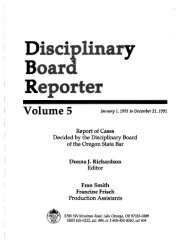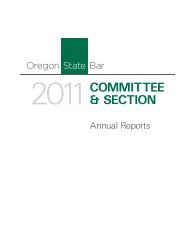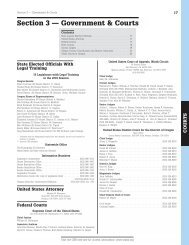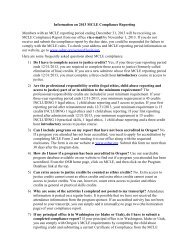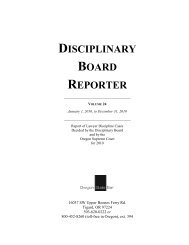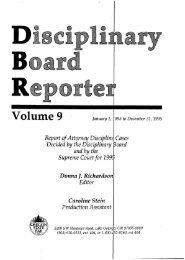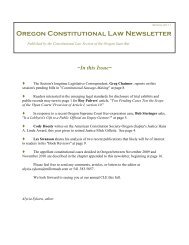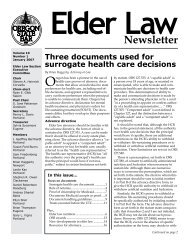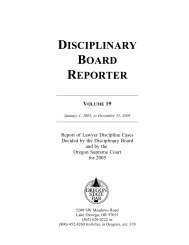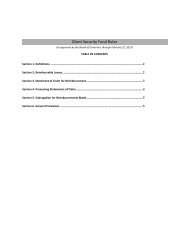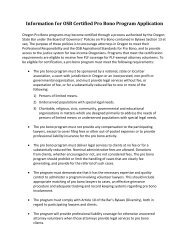February 22, 2013 - Oregon State Bar
February 22, 2013 - Oregon State Bar
February 22, 2013 - Oregon State Bar
Create successful ePaper yourself
Turn your PDF publications into a flip-book with our unique Google optimized e-Paper software.
BOG Agenda Memo — CSF Claim JORDAN (Flores-Salazar) Request for Review<br />
<strong>February</strong> <strong>22</strong>, <strong>2013</strong> Page 2<br />
2.2.2 A lawyer’s failure to perform or complete a legal engagement shall not constitute, in itself,<br />
evidence of misrepresentation, false promise or dishonest conduct.<br />
2.2.3 Reimbursement of a legal fee will be allowed only if (i) the lawyer provided no legal services<br />
to the client in the engagement; or (ii) the legal services that the lawyer actually provided were,<br />
in the Committee’s judgment, minimal or insignificant;….<br />
2.2.4 In the event that a client is provided equivalent legal services by another lawyer without<br />
cost to the client, the legal fee paid to the predecessor lawyer will not be eligible for<br />
reimbursement, except in extraordinary circumstances.<br />
The CSF Committee found no evidence that Jordan had been dishonest in accepting Flores-Salazar’s<br />
advance fee; it also concluded that Jordan’s services were more than minimal or insignificant and<br />
that Flores-Salazar had received the benefit of the remaining services at no additional cost.<br />
Accordingly, the Committee concluded that Flores-Salazar had suffered no loss and that his claim<br />
was, at best, a fee dispute.<br />
Flores-Salazar made a timely request for BOG review of the CSF Committee’s decision. In his<br />
request he cites Jordan’s stipulation for discipline in which Jordan agreed there was “potential for<br />
great injury and Flores-Salazar suffered anxiety and frustration” during the period between Jordan’s<br />
suspension and the appointment of new counsel. The stipulation includes Jordan’s<br />
acknowledgement that he caused actual injury to Flores-Salazar by refusing to refund the unearned<br />
portion of the advanced fees. Flores-Salazar asserts that Jordan was dishonest in failing to disclose<br />
his “original disability, 2 ” in exaggerating Flores-Salazar’s chance of success on appeal, and because<br />
he tried to collect an additional $15,000 while he was suspended. Finally, Flores-Salazar says he did<br />
not receive from the public defender’s office “all of the services I paid Mr. Jordan to complete or<br />
the result he suggested to me.”<br />
Disciplinary Counsel’s Office’s investigation of Jordan is relevant to Flores-Salazar’s<br />
assertions about Jordan’s dishonesty. Jordan was a member of both the <strong>Oregon</strong> and California bars,<br />
focusing on immigration and criminal defense. His practice in California “ran into some problems” in<br />
2003-2004 in connection with eight immigration matters and Jordan stipulated to a 2-year<br />
suspension (all but 9 months stayed) of his California license. The California Supreme Court<br />
approved the stipulation in May 2007, but the OSB had been aware of Jordan’s difficulties for some<br />
time. In October 2006, DCO asked Jordan for information about his status and in June 2007<br />
informed Jordan he would be subject to reciprocal suspension based on the California discipline.<br />
In July 2007, DCO notified the <strong>Oregon</strong> Supreme Court of Jordan’s California suspension and<br />
asked for a similar suspension. Jordan filed an objection, arguing he should be suspended in <strong>Oregon</strong><br />
only for the 9 months he was actually suspended in California. On November 1, 2007, the <strong>Oregon</strong><br />
Supreme Court issued an order suspending Jordan for 9 months, effective immediately. Jordan<br />
asked for a deferred effective date in order to wrap up pending client matters and the court agreed,<br />
making his suspension effective January 1, 2008.<br />
Several of Jordan’s requests for more time to file the opening brief were made during the<br />
time he knew the OSB was seeking reciprocal discipline for his California suspension. His opening<br />
brief for Flores-Salazar was filed five days before the <strong>Oregon</strong> Supreme Court issued its original<br />
suspension order. Accordingly, by that time Jordan knew he would not be able to complete Flores-<br />
2 Presumably this refers to Jordan’s disciplinary problems, discussed below.



